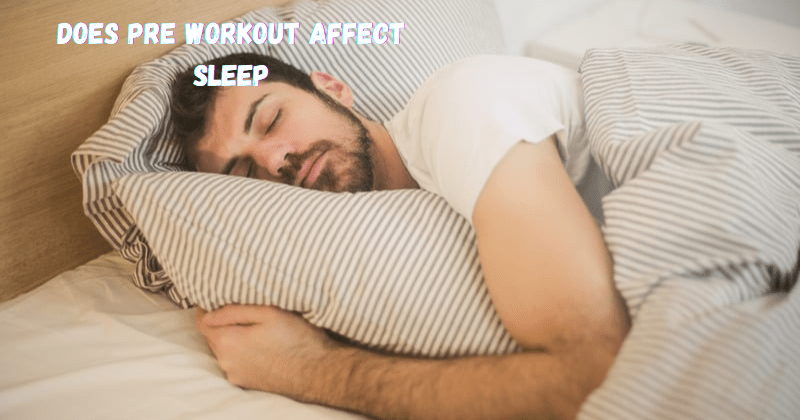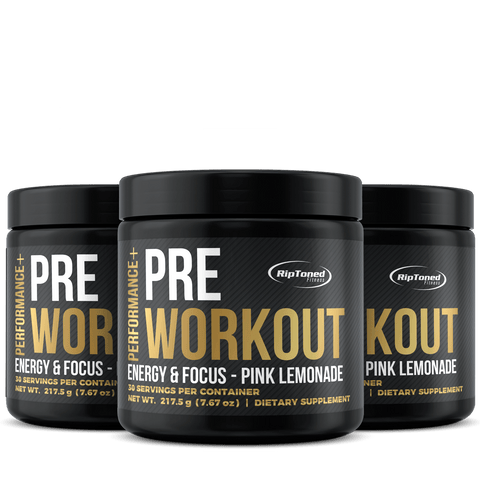
Does Pre Workout Affect Sleep
Share
Have you ever hit the gym after a long day and felt an intense burst of energy that made your workout feel effortless? It could be due to pre-workout, which is becoming increasingly popular among fitness enthusiasts. Pre-workout supplements can provide quick energy boosts before training and other potential performance benefits during exercise.
But while it may seem like the perfect solution for increased energy levels and improved workouts, have you ever stopped to consider how much caffeine pre-workout affects your sleep quality? In this blog post, we'll explore the science behind pre-workout and investigate how it might impact your workouts and much-needed rest times.
Understanding the Basics of Pre-Workout Supplements
Pre-workout supplements are typically marketed as a way to enhance exercise performance and increase energy levels. They usually contain a combination of ingredients such as caffeine, creatine, beta-alanine, and B vitamins, which are known to improve endurance, focus, and strength. These supplements come in various forms, such as powders, pills, or drinks, and can be taken before working out to provide a quick boost of energy and alertness or take a pre-workout.
The main purpose of pre-workout supplements is to increase the body's ability to perform at its best during exercise by increasing blood flow and oxygen delivery and reducing muscle fatigue. These effects can be especially beneficial for those who engage in high-intensity workouts or endurance training, where endurance and stamina are key components.
What are the Main Ingredients in Pre-Workouts?
As mentioned earlier, the best pre--workout supplements contain a variety of ingredients that work together to provide increased energy and improved performance. Let's take a closer look at some of the main ingredients commonly found in pre-workouts:
- Caffeine is the most common ingredient in pre-workout supplements and works by stimulating the central nervous system increasing alertness and focus.
- Creatine: This is a natural substance found in the body that helps produce energy during high-intensity exercises. Taking creatine as a supplement before working out can enhance strength, power, and muscle growth.
- Beta-alanine: This amino acid helps increase levels of carnosine in the muscles, which can improve endurance by buffering against lactic acid buildup.
- B vitamins: B vitamins are essential for energy production and can help boost metabolism, improve mood, and reduce fatigue during exercise.
How Does Pre-Workout Affect Sleep?
While pre-workout supplements may provide numerous benefits during workouts, the use of stimulant ingredients like caffeine has been linked to disrupted sleep patterns. Caffeine stimulates the central nervous system and can cause difficulty falling asleep, staying asleep, and achieving deep sleep – all essential factors for restorative rest.
Moreover, most pre-workout supplements recommend taking them at least 30 minutes before working out, which means that with too much caffeine, the effects may still be present in the body during bedtime. This could lead to a decrease in total sleep time and a decrease in sleep quality, ultimately affecting overall health and well-being.
Additionally, pre-workout supplements may contain high levels of caffeine or other stimulants, which can lead to overstimulation and potential side effects such as anxiety, jitters, and palpitations. These discomforts can make it difficult for the body to relax and wind down for sleep.
Should I Take a Break from Pre-Workouts to Improve Sleep Quality?
While take pre workout after-workout supplements can benefit performance and energy levels, it's important to consider their impact on sleep. If you're experiencing difficulty falling asleep or staying asleep, it might be worth taking a break from pre-workouts to see if there is an improvement in your sleep quality.
If you still want to use pre-workout supplements, consider a caffeine-free or lower-caffeine alternative. This can help reduce the stimulating effects of caffeine consumption on the body and minimize potential sleep disturbances.
Another important factor to consider is the timing of your pre-workout supplement intake. To avoid any interference with bedtime, it's recommended to take pre-workouts at least 4-6 hours before going to bed.
Ultimately, when taking a pre-workout before, it's important to listen to your body and find a balance between the benefits of pre-workout supplements and the need for quality sleep. By understanding how these supplements affect your body and making informed decisions, you can optimize both your workouts and rest times for maximum overall health and well-being.
Natural Alternatives to Pre-Workouts for Improved Sleep Quality
If you're looking for alternative ways to boost energy and improve performance without the potential side effects on sleep, there are a few natural options worth considering:
- Proper Nutrition: A well-balanced diet that includes whole foods and complex carbohydrates can provide sustained energy levels throughout the day.
- Hydration: Drinking enough water before and during workouts can improve energy levels and prevent dehydration without any negative effects on sleep.
- Herbal Supplements: Certain herbs like ginseng, ashwagandha, and rhodiola have been shown to increase energy and improve athletic performance without causing insomnia or other sleep disturbances.
- Sleep Hygiene Practices: Implementing good sleep habits, such as maintaining a consistent bedtime routine, creating a comfortable sleep environment, and limiting screen time before bed, can also contribute to better sleep quality.
While pre-workout supplements may be tempting for their quick energy-boosting effects, it's important to consider their potential impact on sleep. By exploring natural alternatives and adjusting your supplement intake and timing, you can find a balance that supports your fitness goals and overall well-being.
Natural Alternatives to Pre-Workouts for Improved Sleep Quality
If you're looking for alternative ways to boost energy and improve performance without the potential side effects on sleep, there are a few natural options worth considering:
-
Proper Nutrition: A well-balanced diet that includes whole foods and complex carbohydrates can provide sustained energy levels throughout the day.
-
Hydration: Drinking enough water before and during workouts can improve energy levels and prevent dehydration, without any negative effects on sleep.
-
Herbal Supplements: Certain herbs like ginseng, ashwagandha, and rhodiola have been shown to increase energy and improve athletic performance without causing insomnia or other sleep disturbances.
-
Sleep Hygiene Practices: Implementing good sleep habits such as maintaining a consistent bedtime routine, creating a comfortable sleep environment, and limiting screen time before bed can also contribute to better sleep quality.
While pre-workout supplements may be tempting for their quick energy-boosting effects, it's important to consider the potential impact they may have on sleep. By exploring natural alternatives and making adjustments to your supplement intake and timing, you can find a balance that supports both your fitness goals and your overall well-being.
Tips for Getting the Most Out of Your Workout and Avoiding Poor Sleep Habits
In addition to considering the impact of taking pre-workout supplements and after-workout supplements on sleep, there are also a few other tips and habits that can help optimize both your workouts and sleep quality:
- Listen to Your Body: Pay attention to how your body responds to different types of workouts and adjust accordingly. Pushing yourself too hard can lead to physical exhaustion and affect your sleep, while not challenging yourself enough may leave you feeling unfulfilled and restless.
- Avoid Late Night Workouts: Exercising too close to bedtime can disrupt your body's natural wind-down process and make it harder to fall asleep. If possible, try to schedule your workouts earlier in the day or at least 2-3 hours before bedtime.
- Don't Skip Rest Days: Taking breaks from intense workouts is important for allowing your body to recover and recharge. Without proper rest, you may experience chronic fatigue and difficulty sleeping.
- Manage Stress Levels: High levels of stress can not only impact your sleep quality but also affect your motivation and energy levels during workouts. Incorporating relaxation techniques like meditation or yoga into your routine can help reduce stress and improve overall well-being.
- Create a Sleep-Friendly Environment: Make sure your bedroom is dark, quiet, and cool to promote better sleep. Use blackout curtains or a white noise machine to block out potential disturbances.
By implementing these tips and making informed decisions about pre-workout supplements, you can optimize and energy boost both your workout performance and sleep quality for a healthier and more fulfilling lifestyle.
FAQs
Can pre-workout supplements cause insomnia?
While not all pre-workout supplements contain ingredients that can disrupt sleep, many do contain high levels of caffeine and other stimulants that can lead to difficulty falling asleep and staying asleep.
How long before bedtime should I avoid taking pre-workouts?
It's recommended to take pre-workouts at least 4-6 hours before going to bed to avoid any potential interference with bedtime.
Are there natural alternatives to pre-workout supplements?
Yes, several natural options, such as proper nutrition, hydration, herbal supplements, and good sleep hygiene practices, can provide energy and improve performance without negatively affecting sleep.
Should I take a break from pre-workouts if I'm experiencing difficulty sleeping?
If you're experiencing sleep disturbances, it's worth taking a break from pre-workout supplements to see if there is an improvement in your sleep quality. If you still want to use them, consider opting for a caffeine-free or lower-caffeine alternative and adjusting the timing of your caffeine intake, too. It's important to listen to your body and find a balance that works for you.
Conclusion
Pre-workout supplements can improve workout performance, but it's important to be aware of their potential impact on sleep. By understanding how these supplements affect your body and making informed decisions, you can optimize both your workouts and rest times for maximum overall health and well-being.
Remember to consider natural alternatives and implement other healthy habits to get the most out of your workouts and achieve better sleep quality. Prioritizing both physical fitness and rest is key to a balanced and sustainable lifestyle.
So, make sure to listen to your body, stay informed, and find what works best for you. Now, go out there and conquer those goals! Keep moving towards a healthier, happier you.

Click here to try our Pre-workout supplement to feel the benefits it can do for your workouts.
